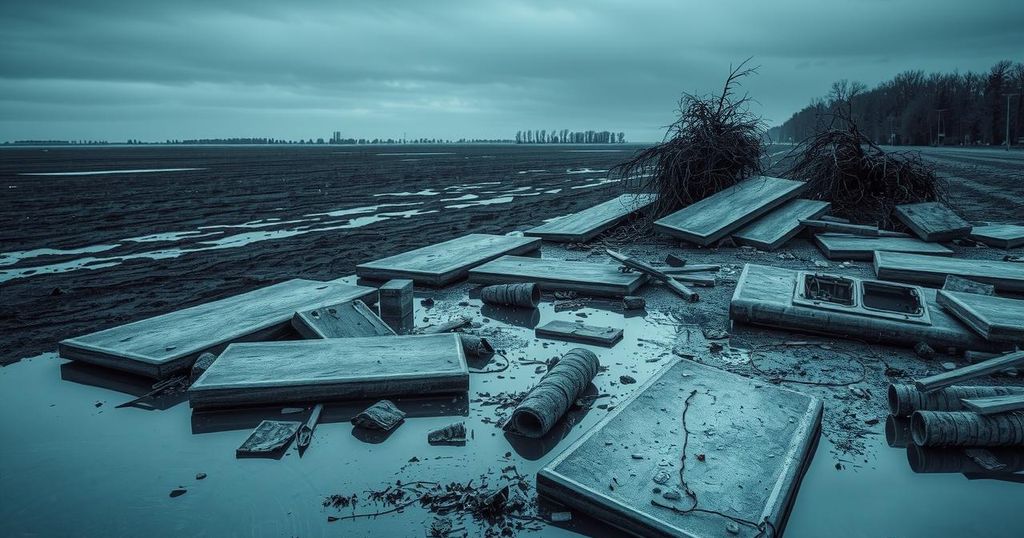Communities in Niger State Face Horrific Stench As Flood Recovery Efforts Continue
Communities in Mokwa Local Government, Niger State, are dealing with the stench from decomposing bodies following devastating floods that killed around 200 people. With over 3,000 individuals displaced and serious health concerns rising, local residents are calling for immediate government action. Financial aid has been announced, but issues remain in locating missing victims and managing humanitarian efforts effectively.
In Niger State, communities are grappling with the awful stench of decomposing bodies following floods that struck Mokwa Local Government Area nearly two weeks ago. Local residents, still traumatized by the disaster that killed an estimated 200 people, report that the odor is a constant reminder of their tragedy and poses significant health risks. The flood, which followed heavy rainfall on May 28 and 29, resulted in the destruction of over 50 homes, displacing more than 3,000 individuals.
The Niger State Emergency Management Agency (NSEMA) confirmed that the official death toll stands at 161, with many corpses still buried under debris. Residents have expressed their despair, as days after the waters receded, the stench of decaying bodies has only intensified. Esther Nwanosike, a local food vendor, shared her concerns about the lingering odor affecting her customers, stating, “The smell is overwhelming… I think it is the corpses that have not been found and buried.”
Added to the health worries, many residents have been left feeling helpless. Another Mokwa resident, Alhassan Kolo, related his experience: “Honestly, some of the bodies we recovered, you can’t even recognize them anymore because they are decaying.” Similarly, Ahmed Yusuf voiced his distress, underscoring the urgent need for government action regarding the recovery of missing victims, stating, “The stench is choking us.”
Further troubling reports emerged from local citizens like Salihu Ishaq, who recounted the massive loss of life, expressing disbelief over the scale of the disaster, which also affected surrounding villages. “This incident is very disastrous because we didn’t expect it… I have a sister who alongside her three children was swept away by the flood,” he lamented. The pain is palpable as families continue to mourn their loved ones.
Vice President Kashim Shettima, who visited the region following the tragedy, announced the Federal Government’s commitment to allocate N2 billion for rehabilitation efforts, alongside food and supplies for those affected. This was complemented by a N1 billion donation from the state government. Amina Abubakar, whose family has not yet recovered from the loss of her sister and children, stressed the urgency of government support, noting, “The government should come in immediately, it is very urgent.”
Idris Ibrahim, the Director of Public Health, assured that the government recognizes the issue of the stench and is taking action with a prevention control team on site. He stated, “We are doing something about it… The governor was there today, it is part of what we are discussing.” The ongoing situation requires immediate attention, especially with residents increasingly anxious about their health and safety.
Reports indicate that the official death count may still rise, as recovery operations continue. On June 4, the NSEMA’s Director General noted that while debris removal was ongoing, they had found additional remains, stressing the government’s commitment to support victims.
In an additional twist, Niger State Governor Mohammed Bago suggested that the floodwaters may have had foreign origins, possibly overflowing from the Niger Republic. His comments during a visit from Borno State Governor Babagana Zulum highlighted the challenges posed by the state’s geographical features. Bago called for proactive measures to relocate at-risk communities and drew attention to the ongoing advocacy against the impacts of climate change.
As aid continues to pour in, both government and citizens face the daunting task of recovery amidst the deep scars left by this disaster. President Zulum’s donation of N300 million exemplifies the urge to support displaced residents, urging the Federal Government to implement measures addressing climate change issues that could help prevent future catastrophes.
The deadly floods in Niger State have left Mokwa communities in despair as they face both the stench of decaying bodies and the urgent need for recovery. Government responses promise financial aid and rehabilitation efforts, but challenges remain in locating missing victims and ensuring health safety for residents. Local voices are clear: immediate action is paramount as they contend with the aftermath of this tragedy. As the search continues, both state and local officials stress the need for long-term solutions to combat future flood risks amidst discussions on climate change awareness.
Original Source: punchng.com




Post Comment